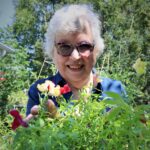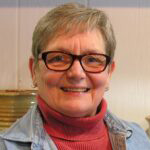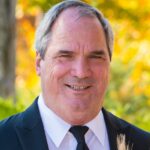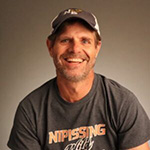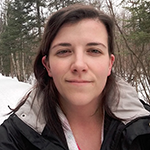Critical care nurse Annette Trudel wants Northern Ontario residents to benefit from her experience treating extremely sick COVID-19 patients at Toronto General Hospital.
Trudel, who grew up in Mattawa and started her career in North Bay, said it’s important to understand how serious the situation has become, especially with hospitals in the region preparing to receive overflow patients from southern Ontario.
“I just want people there to understand the gravity of the situation with COVID,” Trudel said during a telephone interview Tuesday evening.
Raised in Mattawa and trained in North Bay, Trudel wants her experience in intensive and critical care treatment to help educate public
“Yes, it’s real and it’s very important to prevent it from spreading,” Trudel said, adding she understands how people from Nipissing District might have a hard time seeing the danger when there’s such low numbers of people becoming infected at this time.
There were only 15 active cases in the area Wednesday after no new infections were reported and four were resolved. Most of the province’s 2,230 COVID-19 hospitalizations (more than 700 in ICUs), were in southern Ontario.
“It’s really hard to visualize or believe that it’s actually happening, and to be honest, I feel that denial is a big strategy of coping,” she said, describing how even people with family members infected have a hard time embracing the reality.
At the same time, Trudel said it’s vital that health care workers know that the personal protection equipment and protocols will protect them, if used and followed properly. And she wants residents to know they can limit and stop the spread by protecting themselves and those around them.
“I really want people to recognize the seriousness of this virus, but also to be mindful that the key here is to prevent this from happening or to prevent the spread of the virus.”
She doesn’t want her message to be one of panic and gloom, it’s more about arming people with her first-hand insight on the front lines.
Not trying to scare
“I’m not trying to scare the northern communities that I grew up in and that sort of thing, it’s nice just to share what I see … this is my reality and this could be anyone’s reality, too, right?”
Trudel said front-line health care staff need to understand that in a pandemic there’s no “emergency” that calls for someone to put themselves at undue risk of infection.
“There’s nothing, as a frontline registered nurse or health care worker or any health care provider, respiratory therapist, physician doesn’t matter, there’s nothing to fear as long as you’re following proper protocol.
“When you need to attend to a patient who has COVID and there’s risk of contracting the virus, you can’t rush in there until you are properly donned with all your proper PPE,” she said.
Trudel, 33, graduated from Canadore College’s practical nursing program in 2009 and earned a Bachelor of Science in Nursing at Nipissing University in 2012. She worked at the North Bay Regional Health Centre as a personal support worker, registered practical nurse, and registered nurse in the critical care unit.
She also has a Masters in Nursing from Athabasca University and is in the Post-Masters Nurse Practitioner Program at the University of Toronto.
Most advanced type of life support
Trudel works at the University Health Network – Toronto General Hospital, as an intensive care unit nurse and part of the critical care rapid response team. It’s one of the few hospital centres offering the so-called ‘last resort’ ECMO (extracorporeal membrane oxygenation) treatment machines that bypass heart and lungs to provide life support.
“This is the most advanced type of life support you can provide to somebody. Where I work at Toronto General Hospital, that’s their specialty,” she said, adding that nurses who provide ECMO treatment need to be specifically trained.
“So we’re trying to train nurses, fairly new nurses, quickly on this for this type of support. And it’s a skill set that you need to have quite a bit of experience, as a nurse in general, to fully grasp the different intricacies that come with it,” she said. “There are a lot of medical interdisciplinary teams involved in this care. You have to have really strong clinical acumen to identify early when something is not going well with the patient.”
Trudel confirmed that the patients who are being admitted for intensive care at Toronto General are now much younger than those infected in the first and second waves.
“I’ve treated adult patients 18, 20 to 30 to 39, 40 years old, all ages. Covid does not discriminate,” she said. “I’ve seen entire families admitted into the hospital, cases where somebody had passed out at home and was pronounced dead at the scene.”
Trudel said it’s unnerving to check a patient’s past medical history and find that someone has become very sick with no known issues prior to COVID-19.
“I go in to get a report from the nurse about a patient, usually I get a report and … usually it is fairly long, especially considering the type of unit I work on (which includes transplant patients),” she said. “A lot of times, these (COVID-19) patients don’t have any past medical history or no known diagnosed past medical history. So from my perspective as a nurse, when you get a report and they say no past medical history, it kind of really takes you by surprise.”
Paid sick days
Trudel agrees with infectious disease experts calling for paid sick days so people who are ill are not forced to risk infecting co-workers to keep paying bills.
“Especially for multigenerational households, and primarily frontline workers and different areas of work such as factories, grocery stores,” Trudel said.
She also believes it would help if those who are sick are monitored more closely while they isolate at home. It’s important, Trudel explained, to avoid blood oxygen levels dropping to critical levels before going to the hospital for treatment.
“Younger patients can compensate longer and not realize just how unwell they are … They can be short of breath for quite some time and not realize that they’re actually lacking oxygen,” she said.
Check in on patients while isolating
“I think, from a public health perspective, one idea is to have medical personnel, even the nurses, to check in on patients at home that have Covid and just go in and check their oxygenation status and just see how they’re doing,” she suggested.
“That’s a whole other domain as far as public health and policy and from a political standpoint.”
Alternatively, Trudel believes it might help if they were sent home with pulse oximeters to check basic vital signs.
“I think that would make a difference in the sense they would know to receive treatment sooner than waiting until they passed out at home,” she said.
“I’ve seen patients come in and their oxygenation status is in the 40s, the 30s, and they’re young. And you think, ‘Is this real, like, am I reading this correctly?’ But it’s real because we have secondary data to confirm that,” she said, noting a healthy young adult with no other issues, such as heart or respiratory disease, blood oxygen saturation should be 95 to 100.
When the infection gets too far along, survivors face long, hard recoveries, she said, especially if they needed to be put on heart and lung bypass for life support.
“It’s really hard to predict how these patients do … when you are in a hospital and then you’re in the intensive care unit and you’re put on a ventilator and ventilator is not helping you enough.
“And then you have to be put on your stomach to help oxygenate your lungs. That’s very serious,” she said. “We refer to it as proning. And then when that fails and you have to be put on a lung and heart bypass machine, that’s very serious. These patients tend to be in a degree of sustained lack of oxygen for a period of time with Covid, as a result of inflammation throughout the body.”
They don’t know why they’re crying
Asked about burnout among health care workers, Trudel said she sees many people who are sacrificing a big part of their lives to continue saving other people’s lives.
She said the toll can come from many directions.
“I can definitely say I’ve seen it. I mean, burnout can be just feeling powerless within your position and not having any control of your environment,” Trudel said.
“It shows itself when workers have their vacations canceled even when they know they have to keep working. Just observing the trauma patients go through can manifest itself in a health care worker as “vicarious” trauma,” she added.
“It really touched me when I heard my colleagues telling me about how many nurses I was working with who have their kids with their parents and they won’t see their kids for two months (except for virtually on social media) so they can properly isolate when they come home from work or they’ll go sleep in hotels … I feel fortunate I’m not in that situation.”
The nurses, assistant nurses, physicians, respiratory therapists, a lot of people “have sacrificed a lot,” Trudel said.
Going above and beyond
“I see a lot of people going above and beyond … sometimes I see my colleagues just start crying. I don’t know why they’re crying. They don’t know either. They’re just crying.”
Trudel said the thing to avoid, as a northern resident, is to think you can start taking it serious when there’s 30 or 40 cases with community spread.
“The key here is to prevent this from happening or to prevent the spread of the virus and to continue to follow proper procedure,” she said, repeating the often heard mantra since a year ago: “You know, adhere to public health guidelines, social distancing, washing your hands, using hand sanitizer, that sort of thing.
“The purpose of my message is that we can prevent it from getting there (where community spread is prevalent).”
Writer, photographer and proud father. My mom's family is from the Soo with its Algoma Highlands, dad hailed from Cobden in the Ottawa Valley and I spent my teen years in Capreol. Summers were at the beach on the Vermillion River and winters at 'The Rink.' Born in East York but Toronto never was my thing. Ever since a kid looking out the window on long trips, I imagined living on the highway in a little house with a big yard and trees growing all around me.


